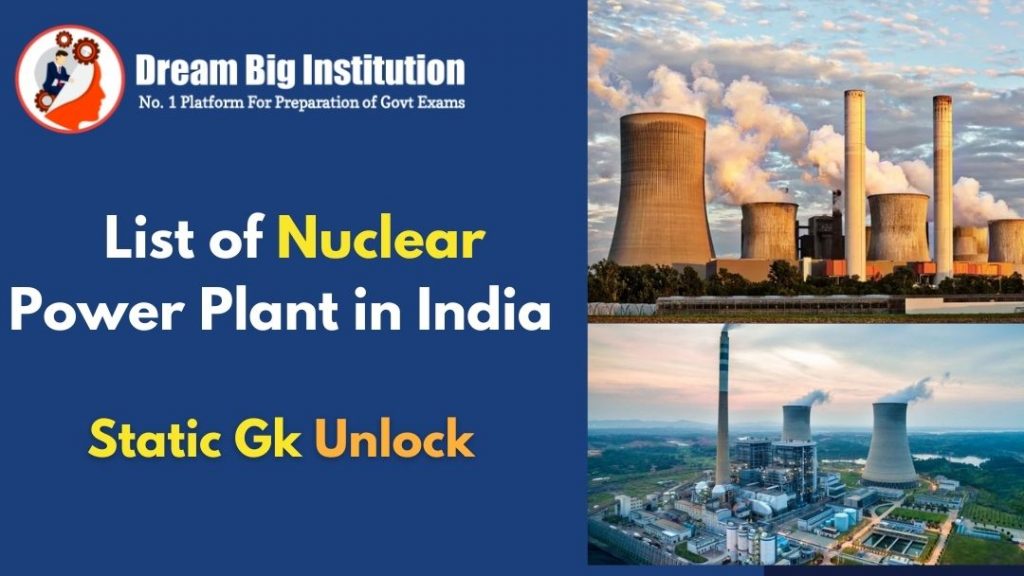Table of Contents
List of Nuclear Power Plants in India 2024
List of Nuclear Power Plants in India: Nuclear Power Plants play a significant role as an energy source in India. The list of nuclear power plants in India provides comprehensive details about these facilities. It is crucial to be aware of the Nuclear Power Plants in India for the general studies and general knowledge sections of government exams such as Bank, SSC, State PSC, and even the prestigious UPSC Prelims Exam 2023. Being familiar with these power plants is essential for a well-rounded understanding of India’s energy sector and current affairs. In this article, you can check the complete list of Nuclear Power Plants in India.
The Mumbai-based Apsara Research Reactor is Asia’s first nuclear power plant. India has a little indigenous uranium deposit; hence the country must import uranium from other nations to fuel its nuclear power industry. Russia has been India’s main source of nuclear fuel since the 1990s.
Nuclear Power Plants in India:
- Nuclear power is one of the most important sources for generating electricity in India. It is the fifth largest source of electricity in India after Thermal (coal), Hydroelectricity (Water), and other renewable sources of electricity like wind solar etc.
- According to 2016 survey, India has 22 Nuclear reactors working at seven locations.
- Having the installed capacity of about 6780 MW and producing a total of 30,292.91 GW/h of electricity.
- Also, 11 more reactors are under construction to generate an additional electricity of about 8,100 MW.
- Responsible for the generation of nuclear power in India has been taken by the Nuclear Power Corporation of India Limited (NPCIL).
- NPCIL is Managed and controlled by the Department of Atomic Energy, Government of India.
- Tarapur Nuclear Power Plant is the largest Nuclear Power plant in India.

Nuclear Power Plants in India 2023
India’s Nuclear Power capacity witnessed a quantum jump after 2014 when Narendra Modi took over as the Prime Minister.
- Going by the exact figures, in the year 2013-14 if the annual nuclear power generation stood at 35,333 Million Units, in the latest year of 2021-22 it stands at 47,112 Million Units.
- This is a nearly 30 to 40 percent increase within a short span of over eight and a half years.
- The Union Cabinet headed by Prime Minister Modi also gave simultaneous bulk approval for as many as 11 indigenous pressurized heavy water reactors in 2017 at a total cost of Rs.1,05,000 crore and a total capacity of 7,000 Mega Watts.
List of Nuclear Power Plants in India
Nuclear Power is the fifth-largest source of generating electricity in India after coal, gas, wind power, and hydroelectricity. India has Asia’s first nuclear reactor the Apsara Research Reactor situated in Mumbai. Currently, India has 22 operational nuclear reactors, out of which, 18 reactors are Pressurised Heavy Water Reactors (PHWRs) and 4 are Light Water Reactors (LWRs).
Given below is the list of 7 sites of Nuclear Power Plants in India. Candidates can download the List of Nuclear Power Plants in India PDF given both at the top and bottom of this article.
| List of Operational Nuclear Power Plants in India | |||
| Name Of Nuclear Power Station | Location | Operator | Capacity |
| Kakrapar Atomic Power Station – 1993 | Gujarat | NPCIL | 440 |
| (Kalpakkam) Madras Atomic Power Station – 1984 | Tamil Nadu | NPCIL | 440 |
| Narora Atomic Power Station- 1991 | Uttar Pradesh | NPCIL | 440 |
| Kaiga Nuclear Power Plant -2000 | Karnataka | NPCIL | 880 |
| Rajasthan Atomic Power Station – 1973 | Rajasthan | NPCIL | 1,180 |
| Tarapur Atomic Power Station – 1969 | Maharashtra | NPCIL | 1,400 |
| Kudankulam Nuclear Power Plant – 2013 | Tamil Nadu | NPCIL | 2,000 |
List of Nuclear Power Stations in India
The Nuclear Power Stations in India table highlights the list of Nuclear Power Stations in India that are under construction along with the capacity and operator.
| Under Construction Nuclear Power Plants in India List | |||
| Name Of Nuclear Power Station | Location | Operator | Capacity |
| Madras (Kalpakkam) | Tamil Nadu | BHAVINI | 500 |
| Rajasthan Unit 7 and 8 | Rajasthan | NPCIL | 1,400 |
| Kakrapar Unit 3 and 4 | Gujarat | NPCIL | 1,400 |
| Kudankulam Unit 3 and 4 | Tamil Nadu | NPCIL | 2,000 |
Planned Nuclear Power Plants In India List
Below is the list of Upcoming Nuclear Power Plant in India. These Nuclear Power Plants are planned to be constructed in near future. The below Nuclear Power Plants in India table lists the nuclear power station name, their location and their proposed capacity.
| Planned Nuclear Power Plants in India List | ||
| Name Of Nuclear Power Station | Location | Capacity |
| Tarapur | Maharashtra | 300 |
| Madras | Tamil Nadu | 1,200 |
| Kaiga | Karnataka | 1,400 |
| Chutka | Madhya Pradesh | 1,400 |
| Gorakhpur | Haryana | 2,800 |
| Bhimpur | Madhya Pradesh | 2,800 |
| Mahi Banswara | Rajasthan | 2,800 |
| Haripur | West Bengal | 4,000 |
| Mithi Virdi (Viradi) | Gujarat | 6,000 |
| Kovvada | Andhra Pradesh | 6,600 |
| Jaitapur | Maharashtra | 9,900 |
First Nuclear Power Plant in India
The oldest nuclear facility in India is the Tarapur Nuclear Reactor in Maharashtra, Western India, which started conducting commercial operations in 1969. With two BHWR reactors of 160 MW each and two PHWR reactors of 540 MW making up a total of 1,400 MW, the reactor is now the second most powerful in India.
The two PHWR reactors were added in 2005 and 2006, whereas the two BHWR were part of the initial installation in 1969.
Largest Nuclear Power Plant in India
The largest Nuclear Power Plant in India is the Kudankulam Nuclear Power Plant (also known as Kudankulam NPP or KKNPP), which is located in Kudankulam in the Tirunelveli district of the southern Indian state of Tamil Nadu.
Static Gk PDF Unlock Series PDF 2024
Hello Dear Aspirants,
Static Gk PDF UNLOCK Series 2024: Static Gk UNLOCK Series is Designed for Those Aspirants Who are Preparing for Government Exam and Wish to Score More in the GA, GS, & Current Affairs Section in Exam Like Bank | Insurance | SSC | Railway | UPSC | DRDO MTS Etc.
FAQs
Q.1.What are the 7 nuclear power stations in India?
Ans. 7 nuclear power stations in India are:
Kudankulam Nuclear Power Plant, Tamil Nadu.
Tarapur Nuclear Reactor, Maharashtra.
Kalapakkam Nuclear Power Plant, Tamil Nadu.
Narora Nuclear Reactor, Uttar Pradesh.
Q.2. Who controls India’s Nuclear Power Plants?
Ans. Nuclear Power Plant in India is controlled by the Nuclear Power Corporation of India (NPCIL). It is a state-owned corporation which was founded in 1987.
Q.3. What is the importance of Nuclear Power in India?
Ans. India’s Nuclear Power is the fourth-largest source of electricity after the thermal, hydroelectric, and renewable sources of energy. India has 22 nuclear reactors operating in 7 nuclear power plants.
Q.4. What is the purpose of Nuclear Power Plants?
Ans. A nuclear reactor produces and controls the release of energy from splitting the atoms of certain elements. In a nuclear power reactor, the energy released is used as heat to make steam to generate electricity.












